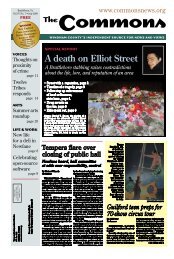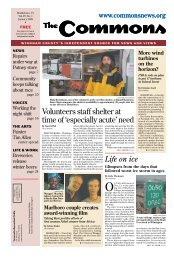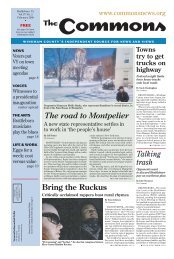neWs - The Commons
neWs - The Commons
neWs - The Commons
You also want an ePaper? Increase the reach of your titles
YUMPU automatically turns print PDFs into web optimized ePapers that Google loves.
2 NEWS <strong>The</strong> <strong>Commons</strong> • May 2010 <strong>The</strong> <strong>Commons</strong> • May 2010 NEWS 3<br />
STATE AND COUNTY<br />
Maple producers:<br />
season was not so bad<br />
Farmers say warmer, shorter season was tougher<br />
in southern Vermont than in the northern counties<br />
By Katy Cowen<br />
<strong>The</strong> <strong>Commons</strong><br />
Maple sugaring season has<br />
ended for the year, with<br />
mixed reactions among<br />
producers about the effect<br />
the weather had on the crop.<br />
Though media reports at the end<br />
of the season generally painted the<br />
season as catastrophic for farmers in<br />
face of the early arrival of spring and<br />
the lack of freezing temperatures at<br />
night in the later half of the season,<br />
local reaction was varied.<br />
“Overall, producers have been saying<br />
this has been a very good year,”<br />
said Kelly Loftus, communications<br />
director at the Vermont Agency of<br />
Agriculture of the season that both<br />
started and ended unusually early.<br />
Doug Harlow’s observations were<br />
more measured.<br />
“This season was spotty — some<br />
people did better than others,” said<br />
Harlow, one of many family members<br />
who work on the family farm at<br />
Harlow’s Sugar House in Putney, and<br />
Brattleboro Subaru<br />
UNDER NEW OWNERSHIP...<br />
Frank Hanenberger is the proud<br />
owner of not one, but two thriving<br />
Subaru dealerships since acquiring<br />
the former Stacy Subaru... now<br />
Brattleboro Subaru! With this new<br />
acquisition, Frank is committed to<br />
extending quality customer<br />
service, and exceptional sales &<br />
service team, and ultimately<br />
serving you with the respect and<br />
appreciation you deserve. What’s<br />
more is that Frank’s ownership of<br />
two Subaru points entitles his customers the advantage of<br />
twice the inventory to find their perfect Subaru! “It’s a fact<br />
that nobody in New England pays less for their new Subarus<br />
than I do! Thanks for choosing Brattleboro Subaru.”<br />
On behalf of Frank, John, and the entire<br />
Brattleboro Subaru Team, we’d like to offer you a<br />
warm welcome to our family.<br />
Luke has over 10 years<br />
in the automotive<br />
industry with the last 5<br />
years at this Subaru<br />
dealership. “I will<br />
work my hardest to<br />
make your buying<br />
experience quick and<br />
painless.”<br />
the son of its owner, Don. “We consider<br />
ourselves lucky. It wasn’t an average<br />
crop, but it was close.”<br />
“<strong>The</strong>re’s always about three generations<br />
on the farm,” he says, and every<br />
member who can is working and<br />
preparing for the crops of a new year.<br />
“We’re always anxious for the maple<br />
sugaring season, because it’s the first<br />
real agricultural crop of the year.”<br />
“This season was good, an average<br />
crop,” said Arnold Coombs, manager<br />
of Bascom Family Farms, the<br />
parent company of Coombs Family<br />
Farms and Brown Family Farms., all<br />
in Brattleboro.<br />
“Usually, you’ll have three or four<br />
days of a good run, three to four days<br />
of freezing, then another good run,”<br />
said Coombs, who serves as chairman<br />
of the Vermont Maple Industry<br />
Council.<br />
This season, though, “there was a<br />
little bit every day…it kept going. It<br />
was long, and then finally just ended.”<br />
Farms that produce maple syrup in<br />
southern Vermont were “off,” Coombs<br />
says, but farms in the northern part<br />
EXPERIENCE E E E THE DIFFERENCE!<br />
F E E John Sciacca is a familiar and<br />
welcome presence to most of you<br />
already. Now General Manager of<br />
Brattleboro Subaru, he continues<br />
to lead with professionalism,<br />
courtesy, and excellence. With<br />
over 16 years in the automotive<br />
industry in the Brattleboro area,<br />
John is no stranger to both the<br />
inner and outer workings of the<br />
Sales, Service, and Parts dynamics<br />
in any dealership. Like Frank, John<br />
is committed to providing you with the very best experience<br />
at Brattleboro Subaru – whether it’s buying your very first<br />
Subaru, or having your fourth one in for an oil change. Stop<br />
by, say hello.<br />
Finance Manager Sales Manager Internet Manager<br />
Lucas Higley Fitz Tarry Edrie Bailey<br />
Fitz has over 15 years<br />
of experience in the<br />
automotive industry.<br />
Fitz looks forward to<br />
making your next visit<br />
to Brattleboro Subaru<br />
the best auto buying<br />
experience you’ve<br />
ever had.<br />
Parts Manager Service Manager<br />
Tony Walsh Shawn McMillan<br />
Tony has forty years<br />
in the automotive<br />
industry with 9 years at<br />
this Subaru dealership.<br />
“I strive to always do<br />
my best for my<br />
customers.”<br />
1234 Putney Road, Brattleboro, VT<br />
800-300-1910 or<br />
802-251-1000<br />
www.vermontsubaru.com<br />
of the state had about an average crop<br />
because it was a little cooler in higher<br />
elevations; the season was longer.<br />
Verdict still out<br />
“Stories are still coming in from<br />
the woods,” said Jacques Couture, coowner<br />
of Couture’s Maple Shop and<br />
Bed and Breakfast in Westfield, near<br />
the Canadian border, with his wife,<br />
Pauline. “I’m hedging when I say this.”<br />
Couture, who serves as president<br />
of the Vermont Maple Foundation,<br />
said that at the 44th annual Vermont<br />
Maple Festival in St. Albans in May,<br />
producers will be able to exchange stories<br />
about the season and foundation<br />
members will be able to “get a better<br />
feel of how the crop actually turned<br />
out,” he says.<br />
Until then, he echoed Coombs’s<br />
observations about the disparity between<br />
southern and northern Vermont<br />
climates and the effects on the season.<br />
“Of course, there are exceptions,<br />
because there are differences in different<br />
regions. I’ve talked to a guy who<br />
produces about 12 miles south of us,<br />
Shawn has over 20<br />
years in the automotive<br />
industry with extensive<br />
Subaru knowledge. “I<br />
will always keep my<br />
promise of 100%<br />
customer satisfaction.”<br />
Brattleboro<br />
Subaru<br />
Hours: Monday-Thursday 8 a.m .- 7 p.m., Friday 8 a.m .- 6 p.m., Saturday 8 a.m .- 5 p.m., Sunday 1 1 a.m .- 3 p.m.<br />
Edrie has over 17 years<br />
of customer service<br />
experience. She handles<br />
all internet sales leads<br />
as well as interacting<br />
with the majority of<br />
our customers. “My<br />
goal is your complete<br />
satisfaction with your<br />
car buying experience.”<br />
No VT<br />
Sales Tax to<br />
NH/MA<br />
Residents!<br />
DAVID SHAW/THE COMMONS<br />
Technology like vacuum tubing helped some maple producers<br />
cope with an unusually warm season. Despite dire predictions,<br />
farmers, the state Agency of Agriculture, and state trade<br />
association leaders say the results were not as grim as widely<br />
reported.<br />
and he said this is the best crop he’s<br />
had in 30 years.,’ Couture said. “And<br />
if someone is using up-to-date vacuum<br />
systems, then the crop was better.”<br />
Location and different weather<br />
conditions aren’t the only factors that<br />
cause differences in yields; technology<br />
used in gathering syrup also makes a<br />
big contribution.<br />
“If you’re using vacuum tubing,<br />
you’re getting a good amount of sap,”<br />
Coombs pointed out.<br />
For Couture’s 7,500 tap operation,<br />
the crop was about average, as<br />
Jen & Jessica<br />
Call or Walk In<br />
802-275-4990<br />
225 Main St.<br />
Brattleboro<br />
(Across from the Library)<br />
he guesses it was .<br />
In the Windham County area, says<br />
Coombs, some farmers don’t have<br />
enough product to meet market demands<br />
for syrup. <strong>The</strong>y might buy from<br />
northern Vermont sellers just to fill<br />
their orders.<br />
Early runs<br />
Many farms found the early start of<br />
the season a save with the early arrival<br />
of spring weather and temperatures.<br />
“Getting tapped out early helped,<br />
because we had those early runs. We<br />
tapped out Washington’s birthday<br />
weekend,” Harlow said. “This season<br />
started early. We made about a third<br />
of what we made this season between<br />
Washington’s Birthday weekend and<br />
March 1.”<br />
Harlow’s brother, who works in<br />
higher elevations on his own farm,<br />
however, didn’t tap as early because of<br />
the colder temperatures and the snow.<br />
<strong>The</strong> variation in crop yield is typical.<br />
“You know, it’s the 20-80 rule: usually<br />
20 percent of the farmers make 80<br />
percent of the syrup,” Coombs said.<br />
More people boiling<br />
“<strong>The</strong> technology available for producing<br />
is making it easier to tap trees,<br />
and making it easier for new people<br />
to tap.” She says this is particularly<br />
true for “backyard, hobby maple<br />
producing.”<br />
“<strong>The</strong>re are many new operations,”<br />
says Couture. “In this area, I’ve seen<br />
about 17,000 new taps between four<br />
new operations. <strong>The</strong>re was a sparked<br />
interest because of the shortage of<br />
maple syrup in past years.”<br />
A shortage of maple syrup production<br />
can result in a spike in maple<br />
syrup commodity prices.<br />
After a time of low prices — about<br />
$2.50-$2.75 per pound — the shortage<br />
of the 2007 and 2008 seasons<br />
caused the price to jump. Between<br />
Christmas of 2008 and the maple sugaring<br />
season of 2009, prices jumped<br />
45 percent to $44 per gallon, or $4<br />
per pound.<br />
Couture said the high prices served<br />
as a catalyst for an increase in new<br />
operations.<br />
“You know, if there’s a segment of<br />
agriculture where farmers can make<br />
a dollar, especially with the economy,<br />
and a lot of people have had their jobs<br />
cut back, they’re going to take advantage<br />
of a crop like that,” he said.<br />
Finishing up<br />
Most farmers finished their season<br />
by cleaning and putting away equipment.<br />
For the Harlow Family Farm,<br />
though, this process takes a back seat<br />
to the preparation for the approach<br />
of other crops.<br />
“We’re really doing two or three<br />
things at a time. We grow strawberries,<br />
blueberries, raspberries, and apples,”<br />
said Harlow.<br />
Cleaning up after sugaring season<br />
usually doesn’t happen for a while<br />
because other tasks get in the way.<br />
“When you’re a small farm, you can’t<br />
hang your hat on one crop, because if<br />
that crop doesn’t go well…” Harlow<br />
said, leaving the obvious unspoken.<br />
Couture, like many other maple<br />
sugar farmers, is also a dairy farmer,<br />
a combination that lets farmers use<br />
more of their resources.<br />
“In Vermont, 50 percent of forests<br />
<br />
<br />
<br />
<br />
<br />
<br />
<br />
<br />
<br />
<br />
<br />
<br />
<br />
12 Elliot St. Brattleboro 257-6911<br />
www.boomerangvermont.com<br />
open every day<br />
<br />
<br />
<br />
<br />
<br />
<br />
<br />
<br />
<br />
<br />
<br />
Natalie, Deena, Danny, and Jenny: non plus ultra<br />
<strong>The</strong> economics of sugaring<br />
By Katy Cowen<br />
<strong>The</strong> <strong>Commons</strong><br />
Maple sugar farmers are still assessing<br />
the market — the impact this<br />
year’s statistics will have on prices.<br />
Actual prices for this year’s season<br />
are provided by farmers throughout<br />
the United States and in Canada;<br />
total numbers and prices specific to<br />
Vermont can be found in the New<br />
England Agricultural Statistics 2010<br />
Report, due in June.<br />
Arnold Coombs, chairman of the<br />
Vermont Maple Industry Council,<br />
predicts that prices will stay where<br />
they are; Kelly Loftus, public information<br />
officer for the Vermont Agency<br />
of Agriculture, says that prices in<br />
Vermont are up.<br />
Jacques Couture, president of the<br />
Vermont Maple Foundation, speculates<br />
that prices for retail will hold<br />
steady, as he sees “no reason for prices<br />
to change much.” But on the commodity<br />
level, he thinks there will be a<br />
“slight reduction” in prices.<br />
“I say slight because, as I’ve been<br />
hearing through the grapevine, I’m<br />
getting a sense that buyers are holding<br />
off, not rushing to buy too much,” he<br />
said. “<strong>The</strong>y want to see what the crop<br />
actually was before they start buying.<br />
<strong>The</strong>y don’t want to pay more than<br />
they have to.”<br />
Canadian market<br />
influences prices<br />
Many factors go into predicting<br />
how prices will fluctuate: the local<br />
economy, total production numbers<br />
in the maple sugar industry, market<br />
demands and trends, and the dynamics<br />
of the Canadian crop.<br />
According to Canada’s Honey<br />
are maple,” Couture said. “<strong>The</strong>re’s<br />
a good likelihood that you own forest<br />
with maple. Many farmers think,<br />
I’ll invest some money and make another<br />
crop.”<br />
When the weather got warm so<br />
quickly, he had to put his post-season<br />
cleaning operations on hold so that<br />
he could start putting manure down<br />
in his fields.<br />
“We’re out, full-force. It’s exciting.<br />
It’s what we do,” he says. n<br />
Council’s Production and Value of<br />
Honey and Maple Products Report,<br />
in 2009, Nova Scotia produced<br />
19,000 gallons of maple syrup; New<br />
Brunswick, 386,000 gallons; Ontario,<br />
417,000 gallons; and Quebec, 8.3 million<br />
gallons.<br />
Quebec is the world’s largest producer<br />
of maple syrup, producing more<br />
than 70 percent of the world’s maple<br />
syrup and 90 percent of Canada’s.<br />
<strong>The</strong> farmer’s union in Quebec has<br />
been largely in control for determining<br />
the minimum prices of the maple<br />
syrup industry for the last eight years.<br />
This year, Coombs said, the<br />
Canadians had a decent crop.<br />
Thankfully, Coombs said, “farmers<br />
can still make money at current<br />
prices” in Vermont, selling mostly at<br />
retail due to the large domination of<br />
the market by small-farm operations,<br />
but with some also selling bulk and<br />
wholesale.<br />
“I think prices will stay stable this<br />
year,” Coombs said. “I don’t see them<br />
dropping, and, hopefully, knock on<br />
wood, I don’t think they’ll increase on<br />
the consumer side. But the Canadians<br />
have been pretty aggressive this year<br />
with prices.”<br />
Wanting more syrup<br />
Demand also has a lot to do with<br />
the pricing, Couture said.<br />
“Maple syrup is viewed favorably by<br />
people who want to know where their<br />
food is coming from,” he said. “<strong>The</strong>se<br />
are people who are aware of highfructose<br />
corn syrup and other preservatives<br />
and sweeteners. <strong>The</strong> culinary<br />
world also ‘discovered,’ you might say,<br />
maple syrup. For many years, maple<br />
syrup was only associated with pancakes,<br />
but now, pancakes are only the<br />
beginning. You can let your imagination<br />
run wild with maple syrup.”<br />
Couture also noted an increase in<br />
demand for darker grades of syrup,<br />
which used to be the last grades to<br />
be sold.<br />
IS THIS WHAT YOUR BOILER LOOKS<br />
LIKE AFTER THIS PAST WINTER?<br />
If so, now is the time<br />
to replace it with a<br />
quality, affordable<br />
Solaia cast iron boiler.<br />
Increasing demands for maple<br />
syrup and other maple products<br />
come from international markets,<br />
Couture said.<br />
“Demand throughout the world<br />
has increased about three times what<br />
it was in the early ’70s,” he said. “In<br />
developing countries, Japan, South<br />
America — these countries usually<br />
buy granulated maple syrup because<br />
it’s easier to ship, but maple syrup is<br />
also being shipped to these countries.<br />
<strong>The</strong>se markets have really helped<br />
cause an increase in demand.”<br />
Helping the industry grow<br />
In 2009, Vermont sugar farmers<br />
produced 920,000 gallons of syrup,<br />
the highest yield since 1944, according<br />
to the New England Agricultural<br />
Statistics 2009 Maple Syrup report.<br />
Vermont remained first in the U.S and<br />
second only to Quebec as the world’s<br />
top producer of maple syrup, so the<br />
consequences of the season — good<br />
or bad — are reflected in the state’s<br />
economy.<br />
“I want to make sure to say how excited<br />
I am about the maple industry<br />
now, even with the economy,” Couture<br />
said. “Maple syrup is one of the bright<br />
lights in agriculture.”<br />
“It’s a great time to be in this industry.<br />
<strong>The</strong>re’s a growth in demand at the<br />
consumer side, and there’s growth on<br />
the manufacturer’s level. If we can expand<br />
at 5 percent a year, which I realize<br />
seems like a lot, then farmers can<br />
expand, and they can make a better<br />
living,” Coombs said.<br />
“We’re a tight knit industry. We’re<br />
all related business-wise; it’s a tight<br />
group. It’s not a six-degrees-of-separation<br />
thing; it’s more like two-degree<br />
separation,” he said, laughing.<br />
“Every drop I sell, I’m helping other<br />
farmers,” Coombs said. “If we could<br />
double the industry in 10 years, which<br />
is something I have suggested as chairman<br />
of the Vermont Maple Industry<br />
Council, that’s the cat’s meow.”<br />
CAST IRON BOILERS<br />
A full line of dependable Solaia cast iron boilers is available from:<br />
BARROWS & FISHER OIL CO.<br />
Call the Comfort Consultant<br />
802-254-4574<br />
or Kearley Fuel<br />
802-874-4921<br />
35 Main St., Brattleboro, Vt.<br />
<strong>The</strong><br />
C ommons<br />
139 Main St., P.O. Box 1212<br />
Brattleboro, VT 05302<br />
(802) 246-6397<br />
www.commonsnews.org<br />
Hours: 9 a.m.–1 p.m., Monday–Friday<br />
Jeff Potter, Editor<br />
Betsy Arney, Manager<br />
Nancy Gauthier, Advertising<br />
Deadline for the June 2 issue<br />
Tuesday, May 27<br />
aBout the <strong>neWs</strong>paper<br />
<strong>The</strong> <strong>Commons</strong> is a nonprofit community<br />
newspaper published since 2006 by<br />
Vermont Independent Media, Inc., a nonprofit<br />
corporation under section 501(c)3<br />
of the federal tax code. This is the last<br />
monthly issue. We will publish weekly beginning<br />
June 2.<br />
<strong>The</strong> newspaper is free, but it is supported<br />
by readers like you through taxdeductible<br />
donations, through advertising<br />
support, and through support of charitable<br />
foundations.<br />
suBmittinG <strong>neWs</strong> items/tips<br />
We welcome story ideas and news tips.<br />
Please contact the editor at editor@<br />
commonsnews.org or at (413) 325-1723.<br />
Most press releases and announcements<br />
of upcoming events appear on<br />
www.commonsnews.org, where they can<br />
be made available sooner.<br />
VoiCes<br />
<strong>The</strong> <strong>Commons</strong> presents a broad range of<br />
essays, memoirs, and other subjective<br />
material in Voices, our editorial and commentary<br />
section. We want the paper to<br />
provide an unpredictable variety of food<br />
for thought from all points on the political<br />
spectrum.<br />
We especially invite responses to material<br />
that we’ve printed here.<br />
We do not publish unsigned or anonymous<br />
letters, and we only very rarely withhold<br />
names for other pieces. When space<br />
is an issue, our priority is to run contributions<br />
that have not yet appeared in other<br />
publications.<br />
Please check with the editor before<br />
writing essays or other original submissions<br />
of substance.<br />
Editorials represent the collective<br />
voice of <strong>The</strong> <strong>Commons</strong> and are written by<br />
the editor or by members of the Vermont<br />
Independent Media Board of Directors.<br />
adVertisinG<br />
Your advertising directly supports a better<br />
newspaper. <strong>The</strong> display advertising<br />
rate is $10.50 per column inch, and <strong>The</strong><br />
<strong>Commons</strong> offers discounts for three or<br />
more advertising insertions. To place your<br />
ad, contact the advertising coordinator at<br />
ads@commonsnews.org.<br />
Advertising files can be saved as PDF<br />
(press-ready setting), EPS (with fonts converted<br />
to outlines), or as TIFF (600 pixels<br />
per inch), or printed as black-and-white<br />
hard copy. We can provide limited creative<br />
services for your ad design and help you<br />
find a professional designer if you have<br />
unusual needs.<br />
sponsor a paGe<br />
Your donation of $50 pays to print a single<br />
page of <strong>The</strong> <strong>Commons</strong>. This contribution<br />
helps us publish a larger newspaper with<br />
more news, and we acknowledge these donations<br />
on the bottom of a page.<br />
Please specify how you would like to be<br />
credited, or whether you wish to donate in<br />
honor of or in memory of another person.<br />
Mail your donation, or contribute online<br />
at http://donate.commonsnews.org.<br />
distriBution<br />
<strong>The</strong> <strong>Commons</strong> distributes 8,000 copies<br />
per issue to hundreds of locations in every<br />
Windham County town. Get in touch<br />
if you would like us to consider adding<br />
your business.<br />
sinCe some<br />
haVe asKed LateLy...<br />
Despite our similar name, <strong>The</strong> <strong>Commons</strong><br />
is not affiliated with Vermont <strong>Commons</strong>,<br />
a statewide journal that is strongly linked<br />
with a movement advocating Vermont’s secession<br />
from the United States.<br />
Vim’s mission<br />
To create a forum for community participation<br />
through publication of <strong>The</strong><br />
<strong>Commons</strong> and <strong>Commons</strong>news.org; to promote<br />
local, independent journalism in<br />
Windham County; and to promote civic engagement<br />
by building media skills among<br />
Windham County residents through the<br />
Media Mentoring Project.<br />
Board of direCtors<br />
Barbara S. Evans, Barry Aleshnick, Alan<br />
O. Dann, Dan DeWalt, Peter Seares, Bob<br />
Rottenberg, Curtiss Reed Jr.











